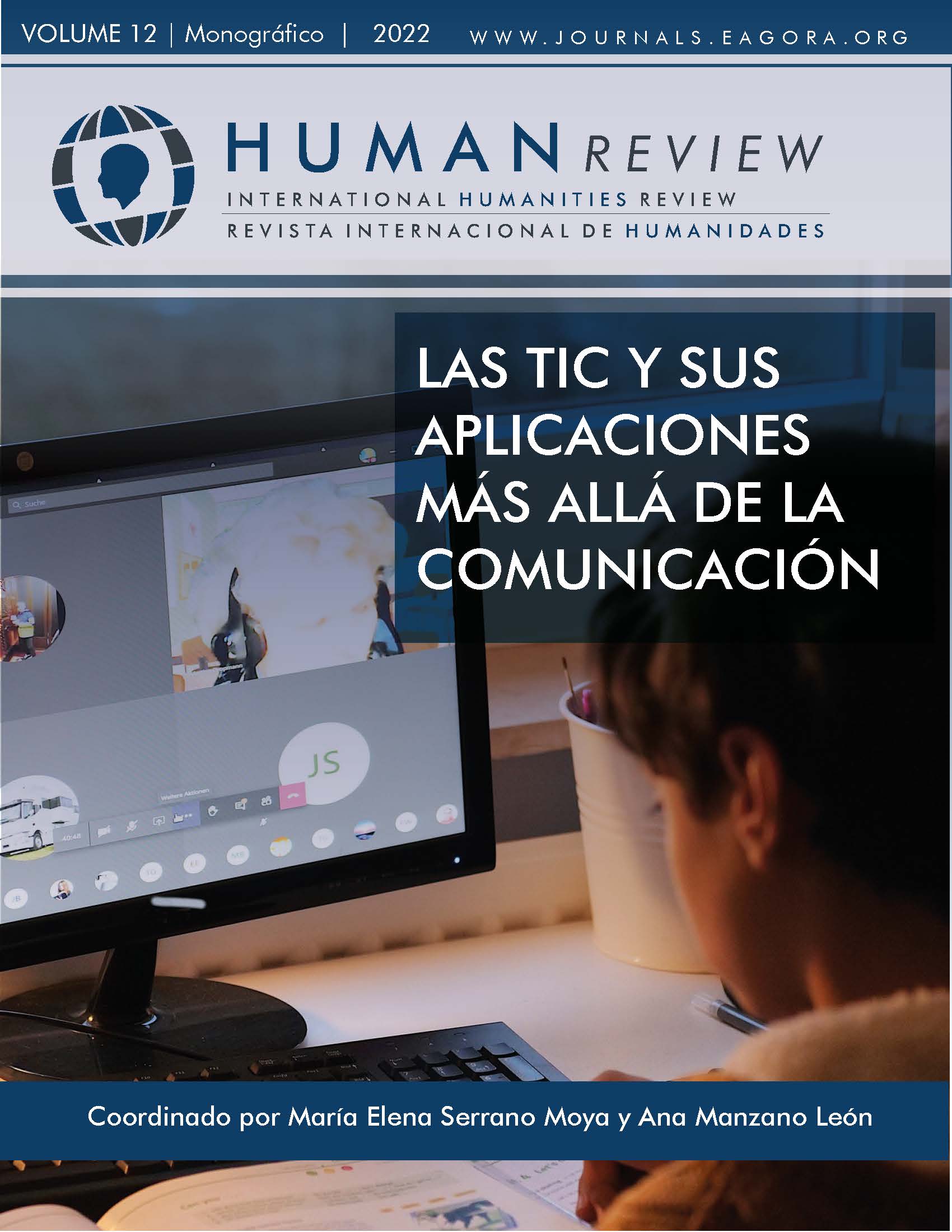Enhancing cognitive and emotional English learning: a didactic proposal
DOI:
https://doi.org/10.37467/revhuman.v11.3953Keywords:
English learning, PLE, Informal learning, Blended learning, Learning with ICT, Student Motivation, Soft skillsAbstract
Ubiquitous learning as the emerging educational paradigm is giving rise to new virtual learning environments. The aim of this study is to contribute to this transformation in learning processes, with a specific focus on advancing English proficiency thanks to an innovative didactic design inspired by the concept of ‘personal learning environment’ (PLE), with the use of videos from YouTube. The findings highlight the potential value of PLEs and show how this design can be effective not only from a cognitive perspective but also as an emotional experience. This technique has also been of use to foster student autonomy and self-motivation.
References
Adell, J, y Castañeda, L. (2010). Los entornos personales de aprendizaje (PLE): una nueva manera de entender el aprendizaje. Morata.
Adu, P. (2019). A step-by-step guide to qualitative data coding. Routledge. https://doi.org/10.4324/9781351044516 DOI: https://doi.org/10.4324/9781351044516
Barrientos-Báez, A. (2019). El desarrollo de la Inteligencia Emocional en los estudios del Grado en Turismo en la Universidad de La Laguna (Tenerife). Tesis Doctoral. Universidad Camilo José Cela. Madrid. https://bit.ly/3wWEPnk
Barrientos-Báez, A., Caldevilla-Domínguez, D., & Rodríguez-Terceño, J. (2020). Integración de la Educación Emocional como Nuevo Eje Conformador en el Grado Universitario de Turismo. Fronteiras: Journal of Social, Technological and Environmental Science, 9(3), 197-219. https://doi.org/https://doi.org/10.21664/2238-8869.2020v9i3.p197-219 DOI: https://doi.org/10.21664/2238-8869.2020v9i3.p197-219
Barrientos-Báez, A. González Suazo, L., & Caldevilla-Domínguez, D. (2021). Nuevos escenarios educativos a partir del covid-19 en la educación universitaria. Perspectivas de la Comunicación, 14(2), 149-170. Universidad de la Frontera-Chile. http://www.perspectivasdelacomunicacion.cl/ DOI: https://doi.org/10.4067/S0718-48672021000200149
Berk, R. A. (2009). Multimedia teaching with video clips: TV, movies, YouTube, and mtvU in the college classroom. International Journal of Technology in Teaching and Learning, 5(1), 1-21.
Brydon-Miller, M., Greenwood, D., & Maguire, P. (2003). Why action research?. Action Research, 1(1), 9-28. DOI: https://doi.org/10.1177/14767503030011002
Caine R. N., & Caine, G. (1997). Education on the edge of possibility. Association for Supervision and Curriculum Development, Alexandria, VA.
Castañeda, L., & Adell, J. (Eds.) (2013). Entornos personales de aprendizaje: Claves para el ecosistema educativo en red. Marfil. https://www.um.es/ple/libro/
Cobo Romaní, C., & Moravec, J. W. (eds.) (2011). Aprendizaje Invisible. Hacia una nueva ecología de la educación. Publicacions i Edicions de la Universitat de Barcelona. https://tinyurl.com/yxn8jrzh
Creswell, J. W., & Poth, C. N. (2018). Qualitative inquiry & research design: Choosing among five approaches. Sage.
Duffy, P. (2008). Engaging the YouTube Google-eyed generation: Strategies for Using Web 2.0 in Teaching and Learning. The Electronic Journal of e-Learning, 6(2), 119-130. www.ejel.org
Fernández Navas, M., & Postigo-Fuentes, A. Y. (2020). La situación de la investigación cualitativa en Educación: ¿Nueva Guerra de Paradigmas? Márgenes, Revista de Educación de la Universidad de Málaga, 1(1), 45-68. http://dx.doi.org/10.24310/mgnmar.v1i1.7396 DOI: https://doi.org/10.24310/mgnmar.v1i1.7396
Hervás-Gómez, C., Vázquez-Cano, E., Fernández Batanero, J. M., & López-Meneses, E. (Eds.) (2019). Innovación e investigación sobre el aprendizaje ubicuo y móvil en la Educación Superior. Octaedro. Colección Universidad.
Immordino-Yang, M. H., & Damasio, A. R. (2007). We feel, therefore we learn: the relevance of affective and social neuroscience to education. Mind, Brain, and Education, 1(1), 3-10. DOI: https://doi.org/10.1111/j.1751-228X.2007.00004.x
Kumar S. (2010). The net generation’s informal and educational use of new technologies. Education, 16(1). https://doi.org/10.37119/ojs2010.v16i1.43 DOI: https://doi.org/10.37119/ojs2010.v16i1.43
Kupchyk, L., & Litvinchuk, A. (2021). Constructing personal learning environments through ICT-mediated foreign language instruction. Journal of Physics: Conference Series, 1840 012045. https://doi.org/10.1088/1742-6596/1840/1/012045 DOI: https://doi.org/10.1088/1742-6596/1840/1/012045
Montes Granado, C. (2015). Active learning inspired in team-based learning and project-based learning. Revista Opción, 31(3), 867-882. https://tinyurl.com/y4qk74yz
Montes Granado, C. (2018). Un diseño de flipped classroom con el uso de las TIC en el aprendizaje del inglés a nivel avanzado. En J. F. Durán Medina, F. J. Godoy Martín y J. Rodríguez Terceño (Eds.). Las TIC en las aulas de enseñanza superior (pp. 271-284). Gedisa. Colección Herramientas universitarias.
Oxford, R. (2015). Emotion as the amplifier and the primary motive: Some theories of emotion with relevance to language learning. Studies in second language learning and Teaching 3, 371-393. https://doi.org/10.14746/ssllt.2015.5.3.2 DOI: https://doi.org/10.14746/ssllt.2015.5.3.2
Patton, M. Q. (2015). Qualitative research & evaluation methods: Integrating theory and practice. Sage.
Sinyashina, E. (2022). Spanish university students’ use of authentic videos and their motives for engaging in this informal activity: a study with EFL learners of different proficiency levels. Miscellanea, 65, 59-86. https://doi.org/10.26754/ojs_misc/mj.20226830 DOI: https://doi.org/10.26754/ojs_misc/mj.20226830
Tan, E. (2013). Informal learning on YouTube: exploring digital literacy in independent online learning. Learning, Media & Technology, 38(4), 463-477. DOI: https://doi.org/10.1080/17439884.2013.783594
Tochon F. V., Karaman A. C., & Ökten C. E. (2014). Online instructional personal environment for deep language learning International Online Journal of Education and Teaching, 1, 147-73. https://www.iojet.org/index.php/IOJET/article/view/32/52
Vázquez-Cano, E., Fernández Batanero, J. M., & López Meneses, E. (2019). Movilidad y ubicuidad en la Educación Superior. En C. Hervás-Gómez, E. Vázquez-Cano, J. M. Fernández Batanero y E. López-Meneses (Eds.). Innovación e investigación sobre el aprendizaje ubicuo y móvil en la Educación Superior (pp. 7-23). Octaedro. Colección Universidad. DOI: https://doi.org/10.36006/16145
Downloads
Published
How to Cite
Issue
Section
License
Those authors who publish in this journal accept the following terms:
- Authors will keep the moral right of the work and they will transfer the commercial rights.
- After 1 year from publication, the work shall thereafter be open access online on our website, but will retain copyright.
- In the event that the authors wish to assign an Creative Commons (CC) license, they may request it by writing to publishing@eagora.org









